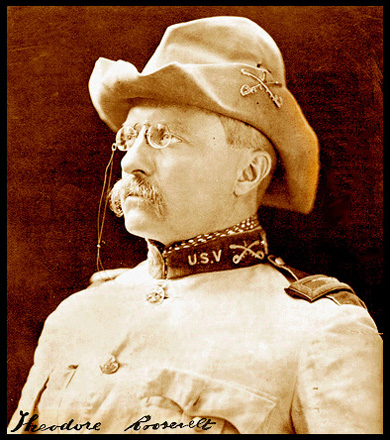


In American history, he is still greatly admired, because of his untiring energy, his many writings, his foresight in Conservation and Defense, and because he was a President of the People in spite of his Aristocratic beginnings.
Theodore Roosevelt, with both his good and his bad points, was and
will remain a purely American phenomenon, and an American Icon.
All of his childhood life, young Theodore was frequently stricken with severe asthma. Interestingly, and unnoticed by the family and apparently Theodore himself, the illness often struck on Sundays. Theodore would spend the night fighting to breathe or would often be taken into the country for fresh air. It is now believed that the illness was psychosomatic, something not understood at the time. As time went on, he suffered less and less from this ailment, suffering very few attacks by the time he was in college.
In an effort to improve the young man's health, his father emphasized the need for Theodore to "make himself" physically. He took this to heart, and worked for hours on gym equipment his father bought for him and his brother Elliot. Contrary to popular history, Theodore did not make himself extremely robust physically as a child, but he did improve himself to be average, with excellent stamina, by the time he entered college. Any deficiencies were outweighed by his determination and enthusiasm.
Theodore was severely nearsighted to a degree not fully understood by the family until Theodore finally got eyeglasses for the first time in 1872.
At the time he entered college, Theodore was five feet, eight inches tall and one hundred and twenty-five pounds. Theodore was considered by some to have a speech impediment. "In conversation, he spewed words with a force that startled people". This may have been the result of his asthma initially, but had become an established trait by the time he entered Harvard.
Whatever Theodore did, he did with intensity. College friends remembered him as an active, enthusiastic, ambitious "bundle of eccentricities". In spite of his attempts to "make himself" physically, Theodore was not a natural athlete, and did not distinguish himself in college athletics. Characteristically, he didn't play any team sports. He was not a champion boxer as he would later claim. Generally, in college, he was considered to be just a bit too odd and consequently he formed no lasting college friendships. However, at college, Theodore's interest in politics was awakened. After graduation, he began attending Columbia Law School, but eventually his active life allowed no time for him to continue.
Theodore Roosevelt spent a total of about three years in the West as a ranchman, from 1883 to 1886. During this time he experienced the adventures and lifestyle of the frontier firsthand. Theodore now became the robust, healthy individual for which he had strived all of his life. His energy and enthusiasm again made up for any lack of knowledge he had as a "greenhorn". He experienced forty hour days in the saddle, cattle stampedes at night, roundups, month-long hunts, rides on the lonely prairies, and even the capturing of an outlaw band.
On April 11, 1886, the town doctor in Dickinson, North Dakota spotted a figure coming down the street. He described the figure as being "the most bedraggled figure" he'd ever seen. The man was limping and covered with mud. His clothes were in tatters. He was scratched and bruised, but determined as a "bull dog". In short, the figure was "the queerest specimen of strangeness that had descended on Dickinson" in the three years the doctor had lived there. It was Theodore Roosevelt. After a chase and being out in the near-zero degree temperatures for nearly ten days, he had just walked forty-five miles in two days guarding a wagon containing three outlaws, without even taking a break to sleep in those two days!
All told, his adventure as a ranchman was a losing venture monetarily. Including lost interest, his losses totalled about seventy thousand dollars. His other investments made up for the loss. It was a time Theodore would not have traded for anything. In later years he wrote many accounts of his experience on the frontier. These experiences would later add to Theodore's popular appeal, and do much dispel the prejudices about his aristocratic upbringing, showing him to be a hardworking man of the people.
Theodore also found himself being asked to run for Mayor of New York. He took the challenge, in spite of a dismal chance of success. He actively campaigned and fought a good, whole-hearted battle, but he came in third in the balloting. It was a great disappointment to Theodore, so much so that he never even mentioned the race in his autobiography. However, at the time, he apparently did not expect to win, as he had already purchased tickets aboard the ocean liner ETURIA under an assumed name, and was scheduled to sail to Europe and Edith only four days after the election.
Theodore and Edith were married in December of 1886. The couple settled in Washington in 1887, where Roosevelt had been appointed to serve on the Civil Service Commission, a post he held until 1895. In that year, he returned to New York as the President of the New York Board of Police Commissioners. The marrage of Theodore and Edith proved to be a strong one, and the two were very happily married until his death. They had five more children - Theodore Jr. (interestingly, Theodore's father was Theodore Sr., and his son Theodore Jr., ...Theodore himself was just Theodore), Kermit, Archibald, Ethel and Quentin.
(As a service to our readers, clicking on title in red will take you to that book on Amazon.com)
*(The above information was taken almost solely from David McCullough's
Mornings
on Horseback . (New York: Simon and Schuster, Inc., 1981).

